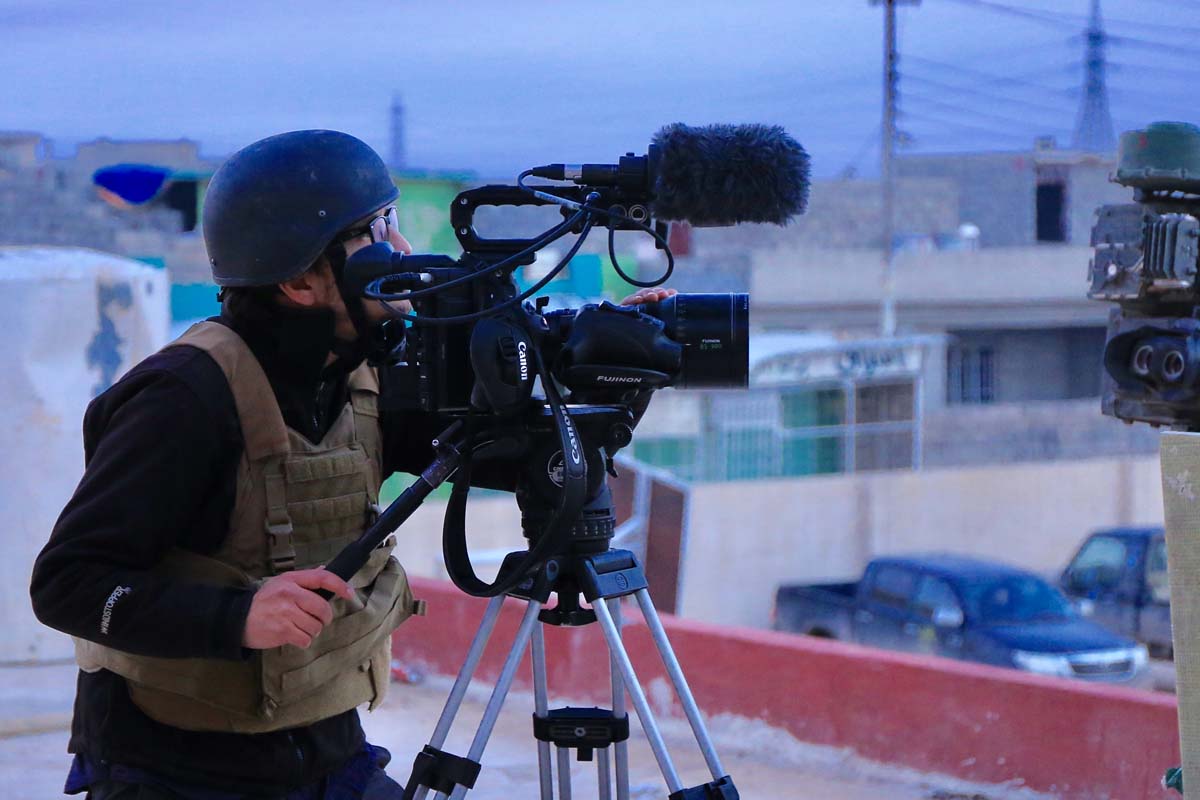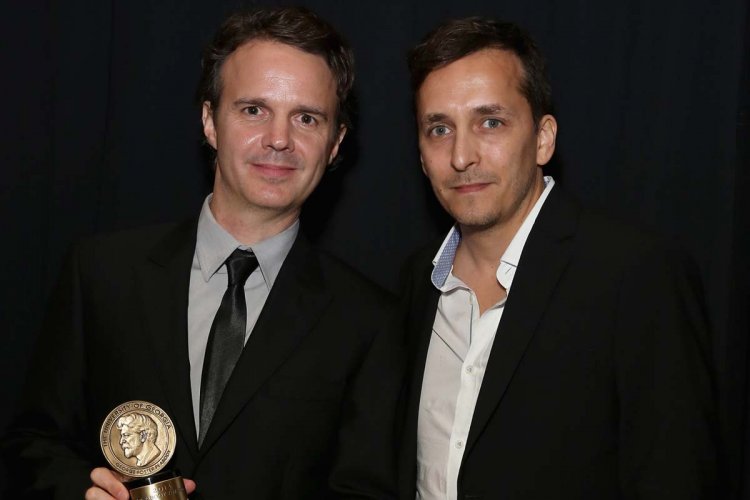
We at IDA feel the full, devastating weight of the tragic death of Brent Renaud. On March 13, he was killed by Russian troops while making a documentary in Ukraine; his was the first reported death of a foreign journalist covering the 2022 war. In expressing his condolences, Ukrainian President Volodymyr Zelensky noted, "We are thankful to Brent for his professionalism and commitment to the values of compassion, ethics and justice."
Renaud was a fighter for truth and humanity, and he went to the most foreboding places to seek out stories, ask the hard questions and show the rest of the world what we don’t often get to see. He and his brother Craig won an IDA Documentary Award in 2006 for Best Limited Series, for Off To War, in which the filmmakers accompanied a team of men from the Arkansas National Guard to Iraq and Afghanistan.
We reached out to those who knew Renaud best—filmmakers, educators, and executive producers on the work that he and his brother risked their lives to make.
Brent’s loss is crushing, and our hearts go out to his family, friends and other colleagues. For all of us here at HBO Documentaries, Brent, along with his brother, Craig, represents the best of what journalists and documentarians do. The Renaud brothers have always approached their subjects with profound respect, humility and honesty. Their work shines with a unique authenticity that speaks to the trust people have placed in them to tell their stories. We know Brent’s life and work will be an inspiration to other storytellers in search of the truth and insight into the human experience.
Nancy Abraham and Lisa Heller
Executive Vice Presidents, HBO Documentaries
Our brave, talented, kind-hearted friend and fellow filmmaker Brent Renaud has been killed in Ukraine. We had the honor of working alongside him for many years. We were and are inspired by his commitment to bringing his camera to capture scenes the world needs to see, no matter the difficulty or the danger.
Brent is a hero who sacrificed for all of us. He deserves to be celebrated. Not murdered. Shame and punishment for the evil doers who make war, not peace.
Long live Brent Renaud.
Jon Alpert
Filmmaker; Co-Founder and Co-Executive Director, DCTV
It was a privilege to work with Brent at The New York Times, where he and his brother, Craig, contributed over a decade of powerful documentary journalism. They brought us the stories they felt needed to be told, compelling stories about often-ignored people and places, and they really dug into them, producing Times docs about Haiti after the earthquake, children fleeing danger in Central America, and cartel violence on the border.
With every project, Brent showed his bravery, his commitment to journalism, and his talent for storytelling. But most of all he showed his humanity. He was intense and committed, and he also made us smile whenever he walked through the door. He was an incredible journalist, a brave soul, and a wonderful human.
Ann Derry
Executive Producer, Documentary and Nonfiction Television and Film
I met Brent Renaud almost 20 years ago, just before he packed up his camera and lit out for Afghanistan, embedded with soldiers from his home state of Arkansas for Off to War, the documentary series that he made with his brother, Craig. He and Craig would travel to Afghanistan, Iraq and other war zones, driven to document human stories in the most inhumane conditions. Some of those same humans—combat vets from Iraq and Afghanistan—met Brent’s body at the airport as Craig brought his brother home to Arkansas this week.
In the continuum of our field, Brent was a bridge between New York’s 20th century direct-cinema makers and the digital storytellers of today. A journalist-filmmaker happiest letting his camera and nuanced edits do the storytelling, Brent was a community-builder who reflected what he learned at Columbia and from DCTV’s Jon Alpert to emerging filmmakers in New York and Arkansas, where he and Craig founded and ran the Little Rock Film Festival.
The Renaud brothers were the first doc filmmakers I ever met. Generous and humble, they opened their process to me and many other emerging filmmakers, showing what was humanly (and humanely) possible in this almost-impossible field.
Keith Maitland
Filmmaker

The late Brent Renaud (right) with his brother Craig, with the Peabody Award that they won in 2015 for their series “Last Chance High.” Photo: Cindy Ord. Courtesy of Jeffrey Jones/Peabody Awards.
Brent Renaud was renowned not just for his war reporting, but for the compassion he brought to his work. From Iraq to Somalia to Mexico, his videography explored human vulnerability and human connection at the worst of times. A US soldier in Fallujah calls his mother on Mother’s Day; a physical therapist coaxes a young survivor of the earthquake in Haiti; a Texas gun dealer’s callous but candid response to why he sells automatic rifles to Mexican drug cartels. Brent’s heart was revealed in the shots he crafted for the films he did.
Brent and his brother, Craig, worked as the Renaud Brothers, and together they won seemingly every broadcast award possible, from the Peabody for Last Chance High (2014), about a Chicago high school for troubled youth; two duPont-Columbia University journalism awards—one in 2012 for a moving look at how Partners in Health helped children injured in the Haiti earthquake; another the following year for Vanguard: Arming the Mexican Cartel, a riveting exploration of how American gun dealers fueled drug cartel murders in Mexico.
The awards told one story, their work ethic told another. They were always working on the next project.
The Renaud brothers were from Arkansas, graduates of Central High School in Little Rock. That sense of being rooted in a place where the trauma of race had scarred a nation resonated in their work. "Brent really valued people," said Jeff Newton, a journalist who worked with Renaud often over the last 10 years. "Brent didn’t see war as people killing other people. He was focused on the suffering. 'I have to record the suffering,' he would say."
Brent went to Ukraine to film a series on the global refugee crisis for TIME Studios. He was supposed to have been gone before the war broke out, but once it did, he remained committed. Brent had 20 years’ experience working in conflict zones; he had taken one of the first courses started by RISC (Reporters Instructed in Saving Colleagues), the organization writer Sebastian Junger founded after photographer Tim Hetherington was killed in Libya. Several friends said they had been involved in helping Renaud find local producers or contacts in Ukraine, but by the time they reached him he had already found someone.
Both brothers had been active in pointing out the security issues facing a news environment where freelancers have to navigate dangerous situations. In a 2013 interview with Filmmaker Magazine, Brent’s brother Craig pointed out that "the most obvious benefit of being backed by a major news organization is that if something goes wrong and you are kidnapped or in need of medical evacuation, you at least have some bit of hope that they might help you out."
Those who knew him say they are certain Brent would have been wearing his helmet and a flak jacket with the word "PRESS" when he went out on Sunday. That’s part of the drill for every reporter who has worked in hostile environments. But following the drill is no guarantee of protection. Brent got hit in the neck and bled out before he could reach the hospital.
June Cross
Filmmaker; Professor, Columbia Journalism School
A version of this tribute was originally published in CPJ, the publication of the Committee to Protect Journalists. Documentary thanks CPJ and June Cross for their permission to republish this excerpt here.
Brent was a brilliant filmmaker. We worked in some insanely bad places together over the years, from months on end in Somalia, to witnessing the fight against ISIS in Iraq, to seeing ISIS’ attempted takeover of Libya. We slept on boats, in bunkers, in blown-up school houses and in shady hotels. He always looked exhausted. Seldom smiled. There was an anxiousness behind those tired eyes. What I saw in them was a man always trying to figure out "what next." He never stopped working. He was consumed by telling people the honest truth behind the stories he covered. He was fearless. You could not intimidate him. He cared deeply about the people he filmed. If you wanted to know what he thought, you didn’t need to ask him. And he probably wouldn’t tell you, because that’s how he hid his grief and emotions. But you could find the answer in his films. He and his brother, Craig, found them everywhere, from economically challenged schools in Chicago to homeless shelters in New Orleans to battlefields far and wide. He was an understated scholar and a reluctant hero of humanity. He won every award that mattered in broadcast journalism. He was an Arkansas kid educated at Columbia U. and later at Harvard as a Nieman Fellow. When he won his Nieman Fellowship, he thanked me for a recommendation letter, as if my letter had even the slightest thing to do with it. It cracked me up because sometimes I think he didn’t even know how talented he was. Beyond humble. I’ll miss him more than I can put into words. My deepest sadness goes out to his family and those who loved him. You know who you are. Brent does, too.
Jeff Newton
Filmmaker; Professor, Columbia Journalism School
A version of this tribute was published by Newton on Facebook. Documentary thanks Newton for allowing us to republish his thoughts here.




